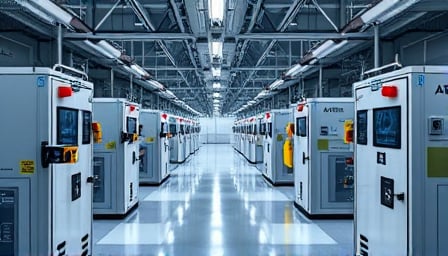Volvo’s Ambitious Plans: A Double-Edged Sword for the Industry?
Volvo AB, the Swedish conglomerate behind some of the world’s most iconic trucks, buses and construction equipment, is making waves in the industry with a series of high-stakes announcements. But beneath the surface of these grand plans lies a complex web of challenges and contradictions that threaten to upend the very foundations of this storied company.
A Global Production Overhaul
Volvo’s construction equipment division, Volvo CE, is embarking on a massive expansion of its global production capabilities, with plans to triple its crawler excavator production across three sites and establish a cutting-edge “smart factory” in South Korea. This move is a clear bid to stay ahead of the competition and capitalize on growing demand for heavy machinery. But it also raises questions about the company’s ability to manage its supply chain, maintain quality control and mitigate the risks associated with such a massive undertaking.
A Safety Focus with a Twist
Meanwhile, Volvo’s 2026 EX60 SUV is set to feature a suite of advanced safety features, including real-time adaptive seatbelts. While this is undoubtedly a welcome development, it’s hard not to wonder whether the company is prioritizing style over substance. After all, Volvo’s reputation for safety is built on a foundation of rigorous testing and innovation – not just flashy marketing gimmicks.
A Warning Sign from the UK
Despite a record-breaking year in UK sales, Volvo has issued a warning due to market concerns. This is a stark reminder that even the most successful companies are not immune to the vicissitudes of market trends. It’s a warning sign that Volvo would do well to heed, lest it fall victim to the same complacency that has brought down so many other industry giants.
A Greenwashing Scandal in the Making?
And then there’s the company’s high-profile partnership with celebrity chef Marcus Samuelsson to cut emissions from food transport. While this may seem like a laudable effort to reduce the company’s carbon footprint, it also raises questions about the sincerity of Volvo’s commitment to sustainability. Is this just a PR stunt designed to burnish the company’s green credentials, or is it a genuine attempt to make a meaningful impact on the environment?
The Bottom Line
In the end, Volvo’s ambitious plans are a double-edged sword. On the one hand, they represent a bold bid to stay ahead of the competition and capitalize on growing demand for heavy machinery. On the other hand, they also raise questions about the company’s ability to manage its supply chain, maintain quality control and mitigate the risks associated with such a massive undertaking. As the industry continues to evolve and adapt, one thing is clear: Volvo will need to be at the top of its game if it hopes to stay ahead of the curve.
